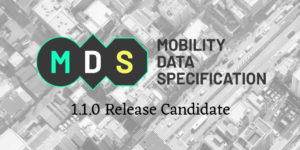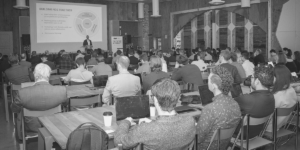A SCARCE RESOURCE
From ride-sharing and shared e-scooters to autonomous vehicles and drones – we’re all aware of the ways in which urban transportation continues to be shaped by technology. In the wake of the coronavirus pandemic, we’ve seen a surge in deliveries and the need for outdoor space to accommodate dining, socially-distanced travel, and other activities. These phenomena have come together to place unique demands on urban curb space.
Across the country, cities have stepped up to manage public spaces and meet the evolving needs of residents. And, while many have made progress in digitizing their curb and other physical assets, technology and data offer new tools to proactively manage curbs and sidewalks, and in doing so deliver more public value from this scarce resource.
Where signs and paint in the right of way communicate city regulations, a digital index or map can provide a digital mechanism for communicating regulations for curb use to fleet operators, delivery services, and navigation apps. Digitizing the curb opens the door for more dynamic regulations and new approaches to curb usage fees that could enable more goal-driven management strategies.
CURBSIDE INNOVATION
As a city-led organization, the Open Mobility Foundation (OMF) is positioned to support this type of policy innovation through the use of a common data specification. Standardized APIs can enable new approaches to curb management, such as:
- Dynamic ride hail pick-up/drop off spaces during special events, like festivals or protests
- Conversion of on-street vehicle parking spaces into designated micromobilty parking
- Time restricted freight/delivery zones to increase efficiency of urban logistics
- Pricing of curb access or parking on a static or demand-responsive basis
- Dynamic or flexible curb use regulations that respond to changing use patterns
To tackle these issues, OMF is launching a Curb Management Working Group, responsible for delivering data and API specifications that facilitate the inventory, exchange, and analysis of information describing curb assets, regulations, and occupancy.
WHAT’S NEXT?
The Curb Management Working Group is moving forward in two major phases: discovery and implementation. During the discovery phase, the working group will review curb management priorities and assess the potential for partnership with other organizations and related projects. The company Coord and the SharedStreets CurbLR project have agreed to present their work for discussion.
During the implementation phase, the working group will apply the OMF’s open source development model to bring together public and private sector organizations to create and release data specifications for curb management.
There are many ways to get involved in the working group. The group will be managed and directed by a steering committee made up of OMF member organizations, including the Los Angeles Department of Transportation, City of Minneapolis, San Diego Association of Governments, San Francisco MTA, City of San Jose, Seattle Department of Transportation, as well as several private sector members of the OMF including Automotus, Coord, and Ford AV. If you’re interested in getting involved, learn more here.




